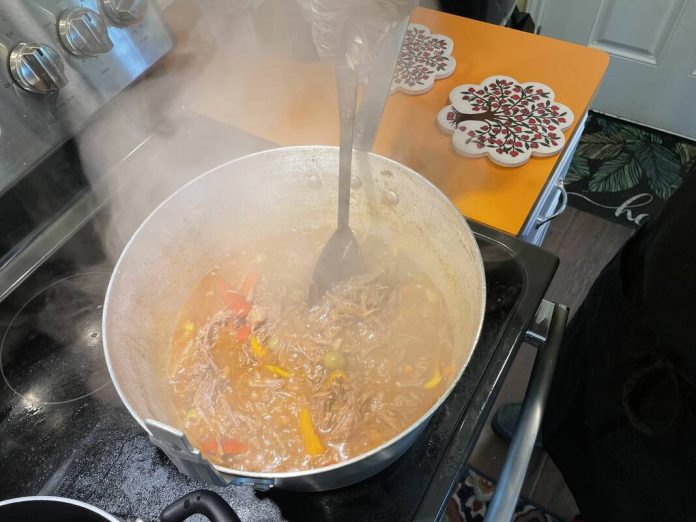DONNA – Bongos and claves cast their hot spells into a home filled with San Miguel de Allende colors.
Spirals of steam whirl like tiny imps from a pot of shredded beef and sweet peppers, casting mischievous glances at guests who grow restless and enamored with wonder.
“Ay candela, candela, candela, me quemo ae,” sings a popular Cuban standard from the TV as Jorge Licea Alvarez stirs a fine broth of Cuban passion, goodwill and friendship while Frida Kahlo winks from a light yellow wall.
“Ropa vieja!” declares Jorge, as he stirs shredded beef, pureed tomatoes, bell peppers and “seasonings” together.
His voice rolls like thunder through a mahogany guitar, powerful and warm and gracious.
“He’s going to serve you lunch,” Julieta says, while green salamanders crawl across kitchen cabinets and masks with exaggerated faces look on from blue walls in the adjoining living room.
Welcome to Casa Cenzontle, where Valley poet Julieta Corpus and her husband Jorge, of Havana, Cuba, have forged a provocative synthesis of two cultures in their lovely Donna home.
Jorge has only been in the United States since June 4, but already people know him for many things: cooking, dancing, singing, and a warm laugh.
Julieta met Jorge during a visit to Cuba in 2017. Within a period of only nine days they were engaged, but their marriage and repatriation in Donna was fraught with much pain and frustration. The Cuban government required numerous documents in both English and Spanish.
They married in 2018, but the pandemic threw shattered glass onto his path to the United States, shuttering the whole process as the world plunged into confusion.
Finally, as the world slowly resurrected itself from this dark time, she was able to send him to Guyana to the U.S. Embassy for more interviews. He finally arrived in June to a grateful Julieta.
“I love this man’s intensity,” she says, looking at him admiringly as he worked his magic.
The seductive breath of the sizzling ropa vieja rushes above the stove, while a knife thumped against a wooden cutting board as Jorge now split potatoes into chunks which he scooped into a separate pot of water.
A shallow skillet was the loom where Jorge wove garlic, onions and vinegar into a marvelous tapestry of flavor called “mojito” that would be married to the “papas.”
And …
“El arroz una mezcla de …”
“Rice with black beans,” Julieta translates. “It’s popularly known as arroz congris.”
He moves about the kitchen with the intensity of a Celia Cruz salsa and the syncopated innovations of a mambo percussion ensemble; the mojito popping and sizzling in a shallow pan.
He multitasks the complex pieces of his culinary ensemble like a grand practitioner assembling the experiences together, all the while explaining in fine detail his craft in a refreshing and novel accent.
“Un tipo de carne de res deshebrada…”
“Shredded beef,” Julieta translates.
“En salsa de tomate, cebolla, garlic and bell peppers and mini peppers,” he continues.
“And he also added some olives for decoration,” she added, to which he clarifies that olives are also part of the main dish.
He speaks with a new kind of articulation in his Spanish words, fast and passionate, and their translation in English is like a colorful blanket now soaked in bleach.
English always fails to capture the flavor of Spanish, and with the fiery and passionate Cuban tongue the failure is even more painful.
But that failure juxtaposed right alongside Jorge’s speech only portrays more fully the elegance and the beauty of Cuban Spanish.
“They have a lot of words that to me make no sense,” Julieta said. “Churre, something that is dirty, but it can be applied to situations, to people, to food.”
With all the fine detail, the spontaneity and the feel for the cooking, he must surely have been a professional chef in his native Cuba.
“No, I’m a lawyer,” he says. “This has been a lifelong hobby.”
It turns out Jorge hailed from Manzanillo, Cuba, before training as a lawyer at Universidad de Oriente in Santiago. He then relocated to Havana, where he lived almost 30 years before beginning his new life here.
Does he want to work as a lawyer here?
“Yeah, it’s possible but I need to learn more English,” Jorge said.
“He wants to be an immigration lawyer – ” Julieta said.
“In Brownsville,” he finished.
A law degree from someone with such artistry and charisma might surprise some people. But it shouldn’t. People too often consider without realizing it that academics and institutional knowledge are the beginning and ending of things.
But in reality, factual knowledge is only the beginning of things, and after that there is passion, there is nuance, there is spirituality and innovation, intrigue and exploration.
Jorge embodies this truth very well. A lawyer by education, he knows the feel and the experience of food, of dance, of laughter and improv.
“Salud!” he says setting a plate of ropa vieja and arroz congris.
Roel De La Garza, a friend of Jorge and Julieta, joins the group to savor the meal. Roel describes himself as a connoisseur of Cuban food.
A bass guitar on the TV starts popping with a piercing delight the notes of another Cuban rhythm, a preamble to the hot chorus that quickly releases images of tropical streets, dancing, palm trees and powerful rhythms. And then the bongos and the voices and the guitar creating a fire, a passion and intensity that is distinctly and unmistakable Cuban.
And Jorge takes the microphone, sings and dances for his guests through the afternoon.





